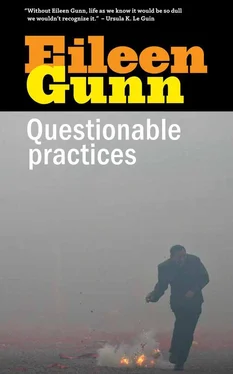Eileen Gunn - Questionable Practices
Здесь есть возможность читать онлайн «Eileen Gunn - Questionable Practices» весь текст электронной книги совершенно бесплатно (целиком полную версию без сокращений). В некоторых случаях можно слушать аудио, скачать через торрент в формате fb2 и присутствует краткое содержание. Год выпуска: 2014, Издательство: Small Beer Press, Жанр: Фантастика и фэнтези, на английском языке. Описание произведения, (предисловие) а так же отзывы посетителей доступны на портале библиотеки ЛибКат.
- Название:Questionable Practices
- Автор:
- Издательство:Small Beer Press
- Жанр:
- Год:2014
- ISBN:нет данных
- Рейтинг книги:5 / 5. Голосов: 1
-
Избранное:Добавить в избранное
- Отзывы:
-
Ваша оценка:
- 100
- 1
- 2
- 3
- 4
- 5
Questionable Practices: краткое содержание, описание и аннотация
Предлагаем к чтению аннотацию, описание, краткое содержание или предисловие (зависит от того, что написал сам автор книги «Questionable Practices»). Если вы не нашли необходимую информацию о книге — напишите в комментариях, мы постараемся отыскать её.
Eileen Gunn
Stable Strategies and Others
Questionable Practices — читать онлайн бесплатно полную книгу (весь текст) целиком
Ниже представлен текст книги, разбитый по страницам. Система сохранения места последней прочитанной страницы, позволяет с удобством читать онлайн бесплатно книгу «Questionable Practices», без необходимости каждый раз заново искать на чём Вы остановились. Поставьте закладку, и сможете в любой момент перейти на страницу, на которой закончили чтение.
Интервал:
Закладка:
The next morning, the captain and Ed and Johnny Dahn had left the camp to check the position of the left flank of the Third Battalion: the company was due to tie in with them later in the morning. They found the Third, checked their position, made arrangements for later. Then they started back, taking an inspection tour of the lines.
They were just finishing the first platoon when a volley of enemy fire broke loose. They hit the ground fast — it sounded like it was aimed right at them. Marines in the line behind them answered with M1s and machine guns.
The call and response of gunfire was like the responses at Mass: first the priest, “ Introibo ad altare Dei ,” then the altar boys, “ Ad Deum qui laetificat juventutem meam. ” You could count on it, and you knew all the voices: the heavy, adult voice of a water-cooled gun, then the chatter of light machine guns; quick, sharp automatic-rifle bursts, followed by flat rapid fire from the Japanese guns, all of it against a staccato drone of grenades and mortar.
When the volley was over, the jungle went as quiet as death. The rain had stopped. In front of the platoon, there was a green wall of trees and brush. Nothing moved there. In the foxholes, marines held themselves immobile, guns in hand, watching the jungle for the slightest movement. Occasionally the sound of a ricochet rang through the trees.
The three marines waited in the silence. Maybe it was five minutes, but it seemed like an hour. Then, dripping wet, like the jungle itself, they made their way back in the rain to the Command Post. They moved cautiously: they didn’t want to startle anyone.
When they got to the CP, however, all hell was breaking loose. The radio was on the fritz, and the men were quickly organizing a circular defense in case of a breakthrough in the lines. While they were busy with that, a wounded kid crawled in on his hands and knees. Ed and Johnny helped him turn over and lie down. He’d been shot three times, once in each thigh and once in the pelvis just below the beltline. No blood, just little round holes, blue at the edges. He was very pale and breathing shallowly: in shock, probably bleeding internally. None of the medical corpsmen were at the CP: the kid needed to be at the battalion aid station, four hundred yards away. Ed and Johnny laid him on a canvas stretcher, and, following the telephone wire, carried him through the heavy warm rain, struggling to keep their feet in the mud.
They’d only gone a short way when they met a party of marines bringing ammunition to the CP. “That was where we got ourselves outfoxed,” Johnny would say later, retelling the tale, ”when we met those guys bringing in boxes of ammo. Quickest shuffle I’ve ever seen. All of a sudden, they were carrying the stretcher away from the lines, and we were headed back to the front, carrying the ammo.”
When they got back to the CP, the captain didn’t even say anything. He just grabbed a couple of boxes and started to the lines. “They were pretty heavy,” Johnny would say. “It seemed like the right thing to just grab a couple myself and follow him.” Ed never talked about it.
Carrying the boxes, they moved up into a haze of gunsmoke and a stench of sulfur. There was an opening in the trees, and they could see one of the guns.
Katie was Irish, of course. Katie Kelly, what else would she be? Not Boston Irish: she was from Pennsylvania and California and New York. Katie liked the Boston Bruins, though. She liked to drive cars, and she liked to drive them fast. She was a fashion-design student, tall and glamorous, with a mass of dark brown hair. Her letters came in Kelly-green envelopes, so he always knew right at the beginning of mail call whether he had gotten anything from her. Sometimes she would send packages, brownies or chocolate-chip cookies, direct to the jungle from Dorchester, Massachusetts.
His mother, rest her soul, had never met Katie, but his father liked her, his brother liked her, his little sister liked her. If he didn’t make it out of the library, maybe he would get to see his mother: he had been to Mass last Sunday, every Sunday, even in the jungle. He had to get to Mass again. Just needed to keep crawling.
You can know only your own pain. This ought to be obvious. You know what’s hurting you, and you try to keep quiet about it — or maybe not. Maybe you wince, maybe you yell — maybe you make a big fuss about nothing. But it’s your own pain, it starts inside you, it is part of you. Only you know what it really means, what it says to you when nobody else is around. You know it like a friend, like a member of your family, like a fraternal twin.
Somebody else’s pain, you’d think you’d have enough sense to know that you don’t know it. But almost everyone has an idea of the appropriate display of someone else’s pain. You say, “You’re being very brave.” Or, “You’re making an awful fuss about nothing.” You say, “That doesn’t hurt so much, now does it?”
For no reason Ed could figure out, he was lying in bed, an ordinary bed in a nice house. No jungle, no rain, no library. He smelled ether. A blonde woman was rubbing ether on his left foot. It was icy cold where it hit the skin, and the heavy, sweet smell of it cut into his head. It hurt like hell, or maybe it was his leg in the jungle that hurt like hell. That’s Katie! he thought, looking at the woman. That’s Katie, but she’s blonde. A thin little boy and a round-faced girl were watching silently. He was not in his proper body: he had only one leg. Why is Katie rubbing ether on it, he wondered. What happened to the other one?
Ether is an antiseptic. Maybe Katie was cleaning some wound he didn’t have yet. Ed was pleased at the thought that there were wounds he didn’t have.
The medic was dead, killed by the same shrapnel that had shredded his leg, and Katie had taken the medic’s place. If he died here, he would just sink into the mattress and feed the trees and the bugs. Mud thou art, to bugs thou shalt return. Ed was muddy, but he would not return to bugs, at least not as long as he could crawl.
When you’re shot, you might feel the pain or you might not. If you need to move quickly, to jump out of a burning plane, for instance, you might not even notice that you are injured until you are, fortunately, safe. Maybe you are so busy trying to survive that you are pain-free until you’re dead. Or maybe not.
If you survive, the cause of your pain will migrate as your condition changes. Before your leg is amputated, your pain is caused by trauma or disease in the part that will be cut off. Afterward, your pain, at first anyway, is caused by the new damage to your flesh and bone that is the amputation. Your body quickly gets to work to repair itself. It knows what to do: local pain first, then a widespread area of pain and tenderness, to keep you still while you heal. Barring infection or gangrene, the inflammation recedes, the wound and stitches heal, the stump forms properly, and the rest of your body gets on with its life. But the major nerves that served your leg have been cut, and they don’t heal in the same way as muscle and skin.
When you have a leg amputated, you may sometimes feel that your missing limb is still there. At first, the sensation may not be painful. It may tingle or tickle or itch. Then it may start to hurt. Your missing toes may be twisted or cramped, and you can’t uncramp them. Your brain is looking for sensation from your foot, and it turns up the volume in search of it. It picks up noise and tries to make sense out of it.
At first, this doesn’t hurt, but as time goes by, the cut nerves in your stump try to grow back down into your leg. They send out tiny fibers, and these fibers have nowhere to go. They get all tangled up. They send impulses to your brain: an itch here, a tingle there. For the rest of your life, your nerves will try to grow into your leg, and will be unable to, because it’s gone. You may interpret these commendable efforts as pain.
Читать дальшеИнтервал:
Закладка:
Похожие книги на «Questionable Practices»
Представляем Вашему вниманию похожие книги на «Questionable Practices» списком для выбора. Мы отобрали схожую по названию и смыслу литературу в надежде предоставить читателям больше вариантов отыскать новые, интересные, ещё непрочитанные произведения.
Обсуждение, отзывы о книге «Questionable Practices» и просто собственные мнения читателей. Оставьте ваши комментарии, напишите, что Вы думаете о произведении, его смысле или главных героях. Укажите что конкретно понравилось, а что нет, и почему Вы так считаете.












